Cal Newport’s Deep Work Summary: Tips to Find Focused Success in a Distracted World

Sorry, there were no results found for “”
Sorry, there were no results found for “”
Sorry, there were no results found for “”

It’s easy to feel like a victim of today’s modern world, where technology has shrunk within the palm of our hands. Instead of getting work done, we mindlessly spend time scrolling through dopamine-hitting content, or worse, switching between emails and tedious tasks that bring us little to no joy.
So yes, it’s getting harder and harder to maintain distraction-free concentration. But we can’t just accept this and stay stuck in a victim mentality now, can we? There has to be a way to push our cognitive capabilities further and find lasting success in a distracted environment.
To win this battle, upgrade your arsenal with Deep Work by Cal Newport—the book that proposes a “deep work” ethic and offers high-value rules and tips to produce elite-level output.
Read our Deep Work summary to explore what this book is all about in a few minutes. We’ll offer key takeaways, strategies, and quotes to help you with deep work scheduling and making the most of your core abilities! 🌞
But before that, if you’re interested in reading more book summaries, check out (and bookmark) our curated collection of 25 Must-Read Productivity Book Summaries (including ‘Deep Work’) in one place. You can save, edit, bookmark, and even export it for later use.

Author(s): Cal Newport
No. of pages: 290+
Year published: 2016
Estimated reading time: 5–10 hours
Computer science professor and author Cal Newport has centered his body of work around helping people navigate digital distractions to focus on deep pursuits. He proposed the concept of deep work to refer to the voluntary effort toward completing cognitively demanding tasks with undivided focus—that’s the sole premise of the book.
The traditional concept of success is weaved into ideas about hard work and perseverance. But Newport believes that our professional efforts tend to be watered down in the modern world, mainly due to setbacks like:
So, how do we determine success—by the number of hours we worked or the value we added to our business? That’s where we start thinking about the deep and shallow work we do.
Now, a lot of people assume that deep work is about leaving your phone for an hour or two during work, but Newport proposes specific criteria for any activity to be considered deep:
Newport reminds us that deep work isn’t about having a higher moral ground. Instead of throwing shade at shallow work or our current digital dystopian distractions (gotta love the alliteration here), he takes an optimistic approach and recognizes both types of work as necessary. It’s just that deep work is what moves the needle in a business setting, representing the tasks that enhance value and boost profitability. 💵
Newport writes about four rules to perform deep work better and improve the quality of professional activities in any field:
Overall, the book has a healthy blend of rules for focused work aimed at employees in a competitive landscape. Newport backs up his theories with decent research and a few insightful stories, making it a pretty engaging read. 💝
Let’s take a quick look at the six super important takeaways from Deep Work.
We understand how weird this sounds, but it’s one of Newport’s golden rules. According to him, humans have a limited cognitive bandwidth each day. The more we overstimulate our brain with “fun” tasks like posting on social media or playing games, the worse our cognitive shape to perform deep work.
Practicing boredom means abstaining from addictive tech to enjoy deeper concentration levels. This can’t happen overnight, though. Instead of taking a one-day break from the internet, the author suggests that people stay away from it almost every hour. After you finish work and until you get home, resist the urge to grab your phone. This will rewire your brain over time.
With all the distractions gone, people naturally gravitate toward problem-solving and tending to their priority list. The downside? Get ready to fight the intense urge to get online and consume what you enjoy. But once you get through, you’ll be able to improve your time management game.
It’s easy to lose track of your deep work commitment because your day gets in the way. That won’t get you anywhere, so quantify everything.
It’s best to have a preset idea of your ratio of deep and shallow tasks for the week, say 60:40. Keep track of all your shallow and deep work hours and revisit how much you could accomplish and where you need to work on or reschedule. For example, if you can only manage 3 hours of deep work in a 40-hour work week, you will likely need to reconsider your time organization.
Pro tip: ClickUp, a free and all-in-one work management solution, offers a bunch of productivity templates to tag your deep and shallow tasks and track and measure them effectively. For instance, you can use the highly visual ClickUp Personal Productivity Report Template to see exactly how much time you spend on tasks and optimize your work output.

This is basically an extrapolation of the previous takeaway: What if your work schedule does not allow for long periods of deep work?
Newport suggests having regular conversations with your manager or supervisor about the status of your day and how you’re unable to add new value to the company with your current schedule. Together, you should be able to brainstorm what part of your day, whether it’s emailing, meetings, or admin work, should be trimmed.
Deep work is an increasingly rare concept in most industries. Newport explains how many knowledge workers have no clear indicators of productivity to guide their tasks. The result? They pick the easiest way to do the job in a visible manner, but whether or not they add value is debatable.
According to Newport, the Principle of Least Resistance is why most employees stick to convenient ways to get work done—with no regard for driving productivity or innovation.
One way to fight this is by practicing self-imposed network isolation. Newport suggests that packed workspaces sacrifice long-term productivity in exchange for having quick solutions to low-end problems.
In open offices, we have quick access to our colleagues who offer conventional tips. But working alone makes you more likely to think hard and find more productive or creative solutions.
Hard work is not enough to win; you need the extra oomph to be considered a formidable talent. Deep Work presents the real-life example of Nate Silver—a super successful statistician and poker player who works with complex technology to communicate tricky data in an easy-to-follow manner. He stands out in his niche in a way no competitor does, making him increasingly valuable to the industry.
Newport wants us to develop two core abilities for surviving and thriving in the modern world economy:
When used at exactly the same time, these core factors equip professionals with the skills they need to surpass competitors. Fortunately, you can master these abilities by allocating enough time to deep work and boosting your brain’s appetite for complicated tasks.
Another ironic yet logical point made in the book is that the time spent being lazy is cool. Whether you’re dealing with a ton of deep, shallow, or logistical-style tasks throughout the day, keep your work hours limited and prioritize rest.
According to Newport, a person’s body needs rest to sustain their deep work ability. No matter what ambitious outcomes you have, take some evening downtime for leisure and relaxation. That’s the only way you’ll be able to come back fresh the next day and retain your deep work ability.
Here are three of the most memorable quotes from Newport’s Deep Work.
If you’re not comfortable going deep for extended periods of time, it’ll be difficult to get your performance to the peak levels of quality and quantity. Unless your talent and skills absolutely dwarf those of your competition, the deep workers will outproduce you.
Producing high-quality output faster gives you a particular advantage in the modern era. Here, Newport describes the current state of many job markets, but he does so while stating the fate of those unable to compete. Those who find deep work uncomfortable can be outmatched by the rest.
There’s no shortcut to success anymore (unless you’re a billionaire’s kid). 😉
Deep work is not the only skill valuable in our economy, and it’s possible to do well without fostering this ability, but the niches where this is advisable are increasingly rare. Unless you have strong evidence that distraction is important for your specific profession, you’re best served by giving serious consideration to depth.
Newport, using the example of brilliant Twitter co-founder Jack Dorsey, states that deep work isn’t the only skill workers need today. Some roles require you to focus on multiple areas at once. However, such positions are relatively rare.
We spend much of our day on autopilot—not giving much thought to what we’re doing with our time. This is a problem. It’s difficult to prevent the trivial from creeping into every corner of your schedule if you don’t face, without flinching, your current balance between deep and shallow work, and then adopt the habit of pausing before action and asking, “What makes the most sense right now?”
Yet another reality check from Deep Work is how the majority of corporate employees spend their time robotically. They’re not really into work for a solid part of the day, and by the time they are, it’s already 5 p.m.
In a world where distraction is cheaper than most things, Newport suggests that everyone question their time expenditure to see whether they’re engaged in something worthwhile or trivial.
💡📚 Enjoyed reading this? You’ll also love our curated collection of 25 Must-Read Productivity Book Summaries. You can save, edit, bookmark, and even export it.

The principles discussed in this book can substantially impact your business, but only if you ensure regular and successful participation in deep work. One way to stay consistent is to leverage task management software like ClickUp. 🤩
The platform is equipped with all the tools and functionalities for practicing and tracking deep work sessions. It also comes with a host of features for high-end scheduling, centralizing work, and saving time on day-to-day tasks.
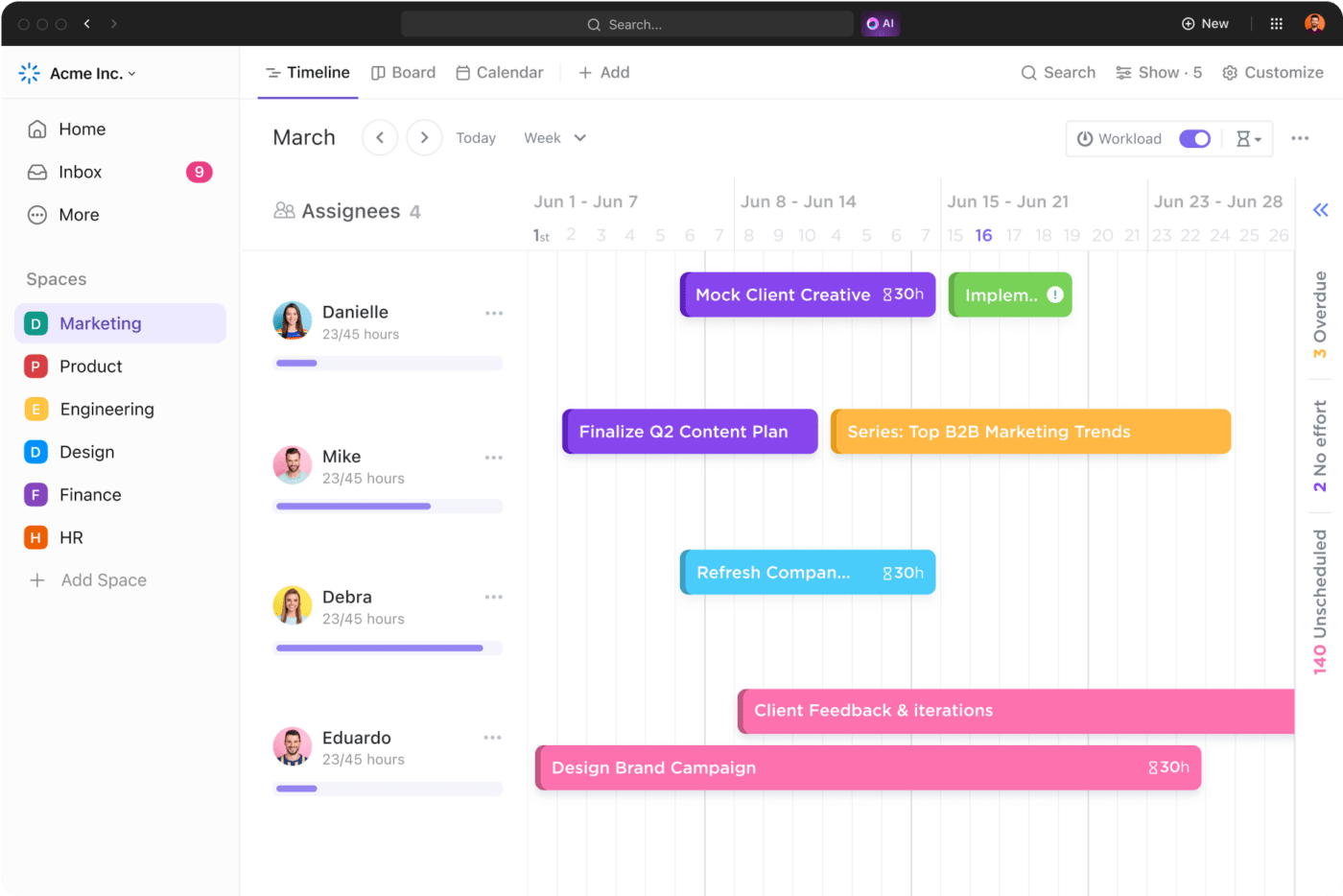
Let’s explore some handy ClickUp functionalities below:
Deep work starts with a clutter-free workspace. With ClickUp Tasks, you can organize your workflow down to a T, giving you complete freedom and ownership over deep work tasks. You can use task tags (visible to everyone in the Workspace) to categorize work into deep and shallow. This is especially beneficial if you’re organizing workflows for your team, as you can enable all your teammates to enjoy distraction-free work hours.
ClickUp Tasks is designed to minimize cognitive context switching due to knowledge-based silos. You can assign links, instructive comments, and attachments to every task to ensure the assignee(s) has everything they need to complete it.
Optimizing your deep work schedule is a cakewalk with ClickUp Calendar. Let’s say you’re planning tasks for the week—you can create tasks on the calendar and use drag-and-drop moves to define your schedule intricately.
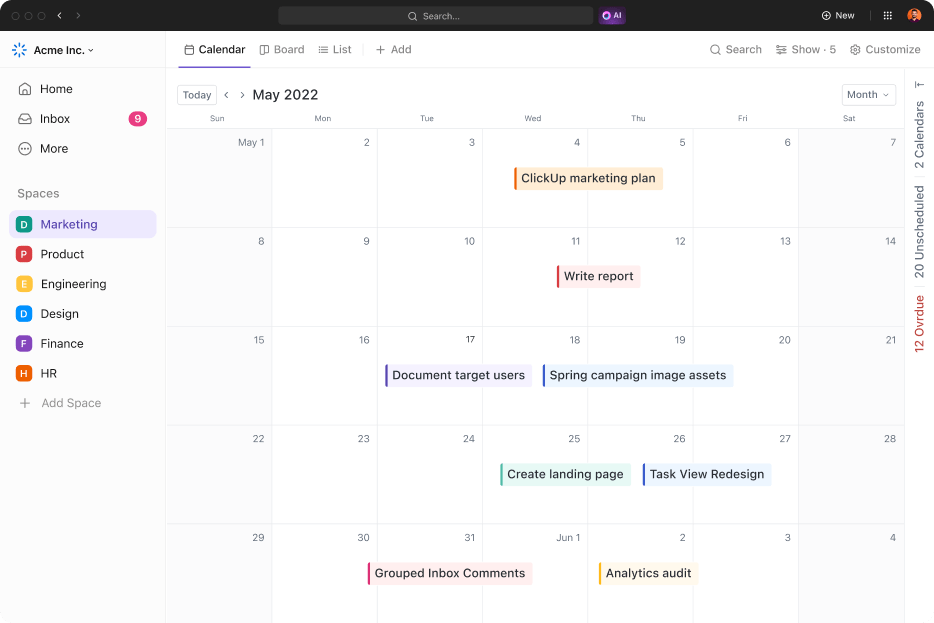
Furthermore, you can always view your tasks in 15+ ways using ClickUp views, such as:
ClickUp is perfect for designing a database of tasks for any industry or team size. Some of its notable deep work and productivity-friendly features include:
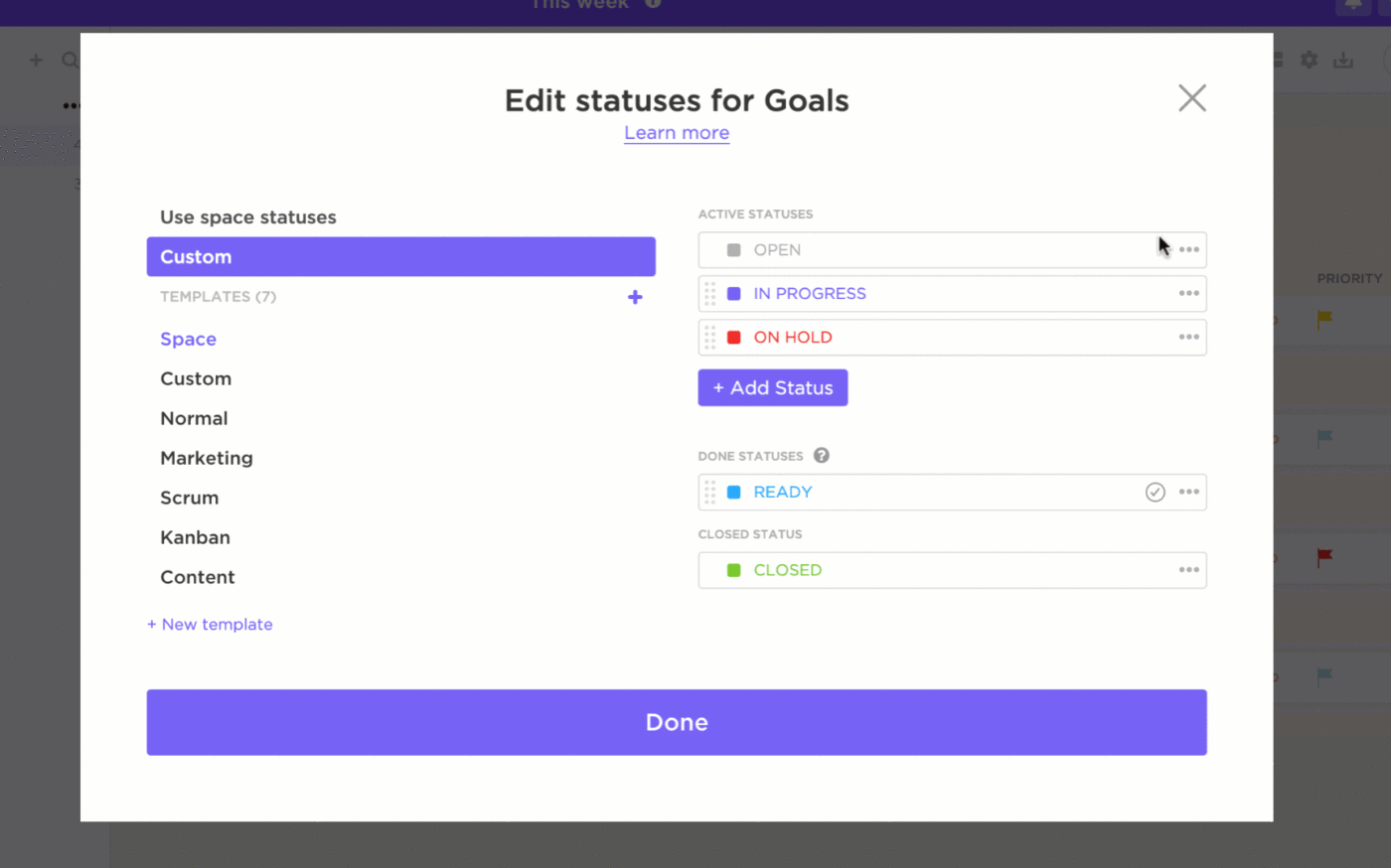
By leveraging these carefully etched-out features, you’ll notice a significant improvement in your team’s performance and productivity. With no backlogs and setbacks slowing you down, you’ll have enough time to explore innovation and growth initiatives. Talk about beating the Principle of Least Resistance. 😁
📮 ClickUp Insight: About 43% of workers send 0-10 messages daily. While this suggests more focused or deliberate conversations, it could also indicate a lack of seamless collaboration, with important discussions happening elsewhere (like email). To prevent unnecessary platform hopping and context switching, you need an everything app for work, like ClickUp, that combines projects, knowledge, and chat in one place—all powered by AI that helps you work more efficiently.
In his book, Newport argues that administrative work, like catching up and replying to emails, is a huge roadblock when trying to practice deep work.
With no-code ClickUp Automations, you can save time on annoying and time-consuming admin tasks like changing task types and statuses, assigning tasks, or moving them to different lists. Automate them using 100+ pre-built options or create your own.
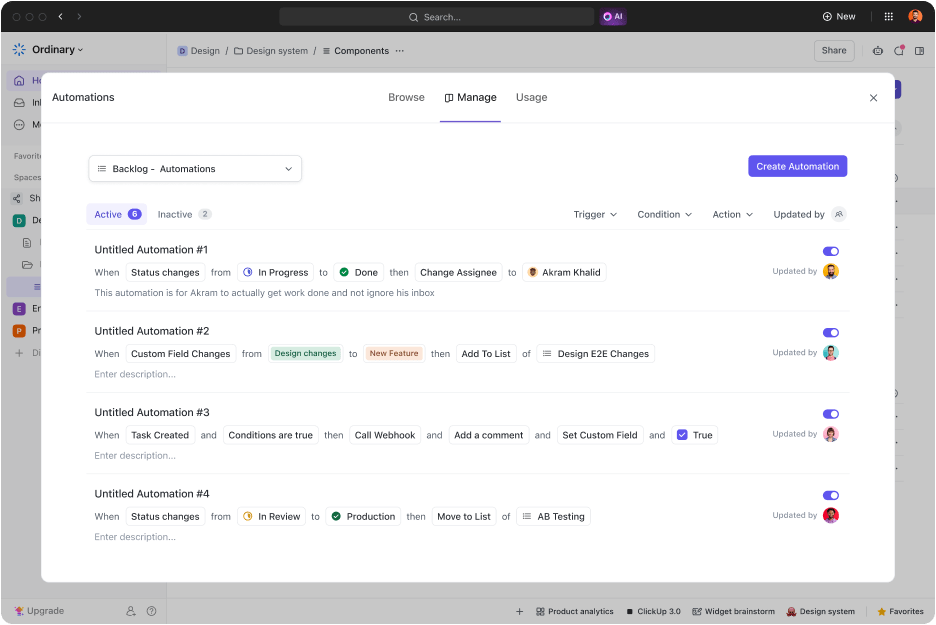
ClickUp Recurring Tasks is another function that allows you to set up specific actions for repetitive tasks depending on factors like frequency or status updates. Customize whether you’d like the exact task to recur or want any changes the next time!
What do you do when you have to communicate a priority task? You write up a big email or Slack message and then find the correct recipients to share the message with. Or, you can use ClickUp Task Priorities.
Label any task with four labels—Low, Normal, High, and Urgent and keep all team members aware of what they need to do and by when. You can even prioritize your personal deep work tasks and block your schedule to address them immediately.

You can always see how much time you or your team are spending working deeply with ClickUp’s Project Time Tracking. It’s available on all devices and allows team leaders to leave notes as feedback for future planning.
Whether you’re working deep or shallow, ClickUp Goals doesn’t distinguish. Create any type of goal for you and your team to work on and track progress automatically. With a percentage view, any team leader can evaluate the number of value-driven activities ticked off.
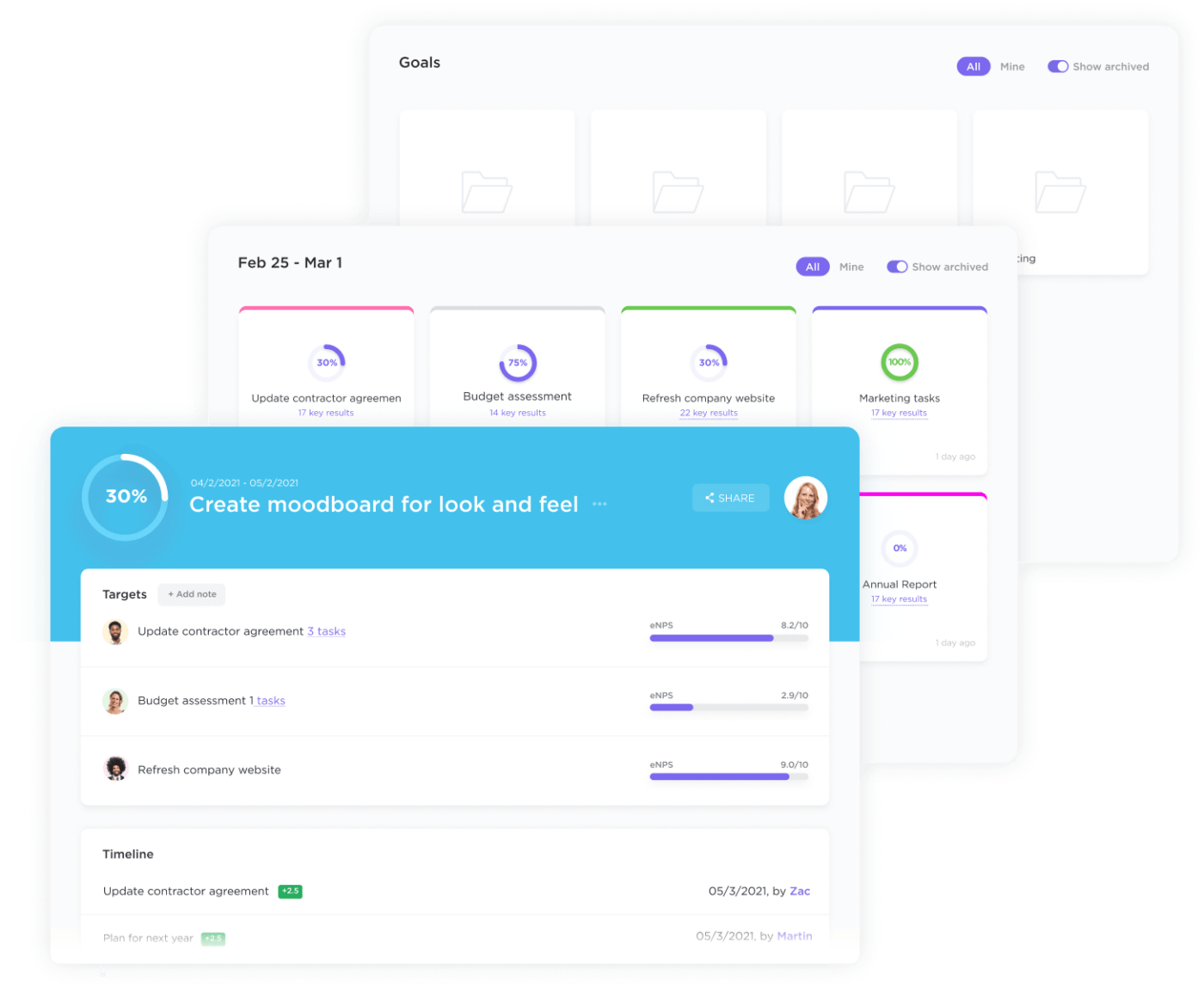
If you’re looking for more detailed progress visualization, ClickUp Dashboards are your best friend! Choose from 50+ cards to build a holistic dashboard that displays the metrics you want to track.
Lastly, you can set customizable ClickUp Reminders from any device to receive alerts on pending tasks and meetings. You have everything you need to excel professionally. ✌️

Newport’s deep work theory is one of the best productivity approaches in recent times. However, getting the hang of this method requires patience, hard work, and the proper tools.
Thankfully, with ClickUp’s time tracking, productivity features, and 1,000+ templates, you can easily incorporate deep work habits and check your progress simultaneously.
Sign up today to get started and make deep work work for you. 🔥
© 2026 ClickUp